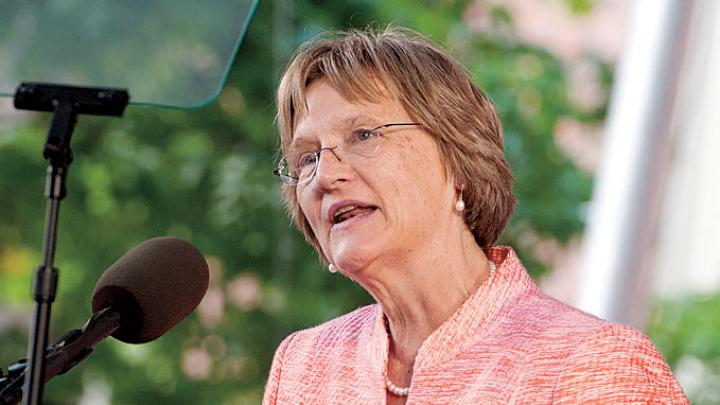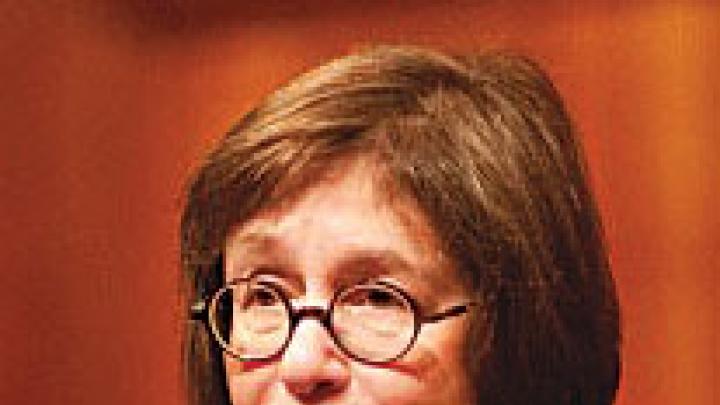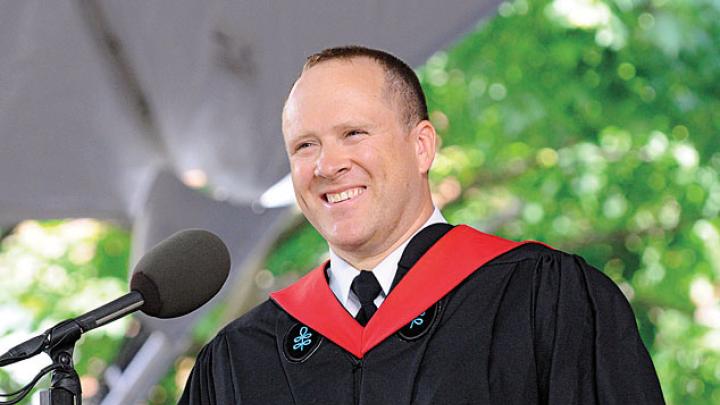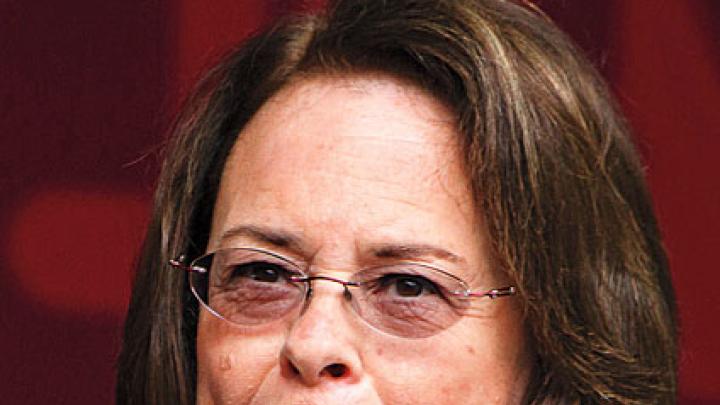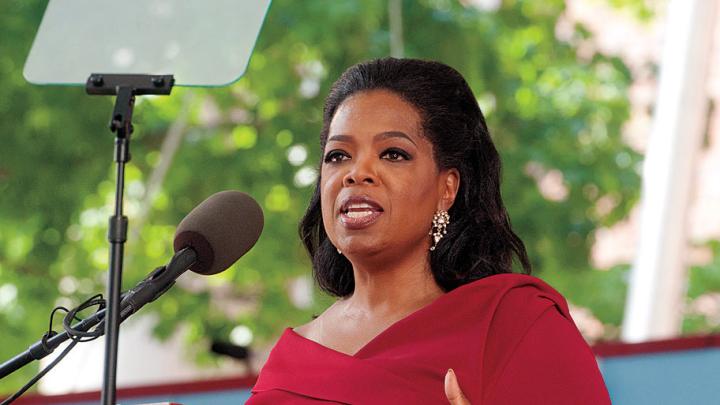Serious rhetoric prevailed for much of this Commencement, not yet seven weeks past the post-Boston Marathon bombing manhunt that shut the city down. Nonetheless, the addresses varied in tone and texture. Phi Beta Kappa orator Linda Greenhouse put evolving social attitudes into a fine-grained, crimson context. Business School class day speaker Ann Moore glossed changing management mores. Graduate English speaker Jon Murad challenged Harvard perceptions in order to teach about service. President Drew Faust highlighted universities’ mission—and threats to it. And in a year when it seemed Harvard needed someone it could talk to, Oprah Winfrey had soothing advice. For reports on all the principal addresses, visit harvardmagazine.com/commencement-2013.
Too Long Unacknowledged
Deploying the storytelling skills that earned a Pulitzer Prize for her New York Times Supreme Court reporting, Linda Greenhouse ’68, a member of the Board of Overseers, delivered an unusually personal oration. She recalled her service as chief marshal during the 1993 Commencement, when the guest speaker, General Colin Powell, symbolized the military’s discriminatory policies toward homosexuals—an issue society and the court had yet to resolve:
I started getting calls from classmates after General Powell’s selection had been announced. I knew some of these classmates, but not most of them. I’m gay, these classmates told me. And they asked: How can I possibly participate in a ceremony honoring someone who embodies a policy that withholds dignity and respect from men and women who want only to serve their country? How can I enjoy my reunion?
Protest seemed likely. At the luncheon she hosted between the morning exercises and Powell’s address,
I invited one of my very out classmates, who arrived in his top hat and tails, festooned with banners and buttons proclaiming the gay-rights cause and denouncing “don’t ask, don’t tell.” He went up to Colin Powell, whose uniform was festooned with a general’s stars and medals.…“General Powell,” my classmate said, “I look forward to the day when this issue no longer divides us.”
…For all my classmate knew, General Powell would spurn him, cut him dead. Instead, the general embraced him with both arms, and replied: “So do I, and I hope that day comes sooner rather than later.” My classmate was so taken aback and touched by this response that he had tears in his eyes as he recounted it to me. Word of the encounter spread quickly among the gay community as the crowd gathered in Tercentenary Theatre.…The mood had shifted: the anxiety and incipient anger were gone. When General Powell got up to speak, some of my classmates stood in silent, dignified protest. The general acknowledged them graciously. What might have been an experience of pain and isolation became instead one of solidarity and community.
…I saw connections being made among people who, while they had a Harvard degree in common, had been in a basic sense strangers to one another.…Wounds that for too long had gone unacknowledged were at last being recognized and healed.…Harvard,…through an accident of history, had nonetheless managed to bring us together in a way that no one could have scripted and no one would ever forget. We were, as always, but in a new way, in Harvard’s debt.
Sobering Up Corporate America
In the Business School’s fiftieth-anniversary year of admitting women to the M.B.A. program (see page 55), Ann Moore, M.B.A. ’78, former chair and CEO of Time Inc., took this year’s graduates back in time:
I had two things in my first New York office in corporate finance that you won’t find in your offices. First, the absolutely all-essential adding machine.
The second? A fully stocked liquor cabinet.
For those of us who had young children at home, getting blasted at work wasn’t on our schedule. I think working mothers should take some credit for sobering up Corporate America. The good old days weren’t all that great, as I recall them.
A Municipal Cop
After college, Jon Murad ’95, M.P.A. ’13, became an actor. But “something tugged at me,” he wrote in his tenth-anniversary class report—and he joined the New York Police Department, where he learned the virtue of clip-on ties (useful, he told the morning-exercises crowd, “if someone’s trying to choke you”). About to earn a midcareer public-administration degree, he put service in the context he had learned during the past 18 years:
Back then, greatness was the only option, and if you’d told me then that I’d end up a cop in the Bronx, I’d have slooowly backed away. Harvard graduates don’t take jobs like that; they become ibankers and start-up entrepreneurs.…
My hope today, in this time before the diplomas and the family photos and the deservéd revels, is to remind us all—to assure us all—that there is as much stature in our being social workers and teachers, soldiers and preachers, nurses and, yes, even cops, as in being presidents and poets laureate.
A lot of you know this already, but I did not, when first I sat out there. And now? I’m probably not the only municipal cop in the country with two Harvard degrees, but I’m surely in a tiny cohort, and that’s not a boast, it’s a lament. If there is something special about this place and the lessons we’ve learned here, and I think there is, then America—the world—needs people like you in these roles.
“The usual work of this University”
In a year when disasters natural (Superstorm Sandy, a blizzard) and manmade (the Boston Marathon bombing) closed Harvard for the first time in a generation, President Faust devoted her afternoon address to explicating universities’ role in society—and a manmade obstacle to their continued success. Starting with nature, she said:
[T]he weather isn’t something that simply happens at Harvard.…It is a focus of study and of research, as we work to confront the implications of climate change and help shape national and international responses to its extremes.
Similarly for the Marathon bombings, where she cited the work of University security officers; personnel from the affiliated hospitals who treated the wounded (all survived); researchers seeking to improve trauma care; and scholarship on emergency leadership, humanistic and behaviorial aspects of terrorism; and more. Summing up, she said:
Three unusual days, making for an unusual year. Yet these three unusual days illuminate and underscore the usual work of this University: calling on knowledge and research to address fundamental challenges and dilemmas with resources drawn from the widest scope of human inquiry—from the insights of natural and social sciences to the reflections on meaning and values at the heart of the humanities. Universities urge us towards a better future and equip us as individuals and as societies to get there.
Yet this work cannot be taken for granted, she said, given new challenges to the “fundamental assumptions undergirding American higher education and the foundations of our nation’s research enterprise.” Faust reviewed the university-public research partnership during the past half-century, now at risk from “the erosion of federal support for research—a situation made acute by the sequester.”
The world and the nation need the kind of research that Harvard and other American research universities undertake. We need the knowledge and understanding that research generates—knowledge about climate change, or crisis management, or melanoma, or effective mental health interventions in schools, or hormones that might treat diabetes, or any of a host of other worthy projects our faculty are currently pursuing. We need the support and encouragement for the students who will create our scientific future. We need the economic vitality—the jobs and companies—that these ideas and discoveries produce. We need the nation to resist imposing a self-inflicted wound on its intellectual and human capital. We need a nation that believes in, and invests in, its universities because we represent an investment in the ideas and the people that will build and will be the future.
…Even in a year when sometimes the world felt too much with us, we have never lost sight of how much what we do here has to do with the world. And for the world. To sequester the search for knowledge, to sequester discovery, to sequester the unrelenting drive of our students and faculty to envision and pursue this endless frontier…puts at risk the capacity and promise of universities to fulfill our commitment to the public good, our commitment to our children and grandchildren and to the future we will leave them.
TALK THERAPY A year ago, Oprah Winfrey said, when her new network seemed a flop, Harvard came calling. She repaired to the shower (“It was either that or a bag of Oreos”) and emerged determined to turn her business around before her Commencement address. “There is no such thing as failure,” she said. “Failure is just life trying to move us in another direction”—so graduates must consult their “internal moral, emotional GPS.” Success and happiness would follow, as it had for her, if the graduates “fulfill the highest, most truthful expression of yourself as a human being. You want to max out your humanity,” she urged—and then concluded, like her interview subjects anxious to be validated, “Was that okay?”
